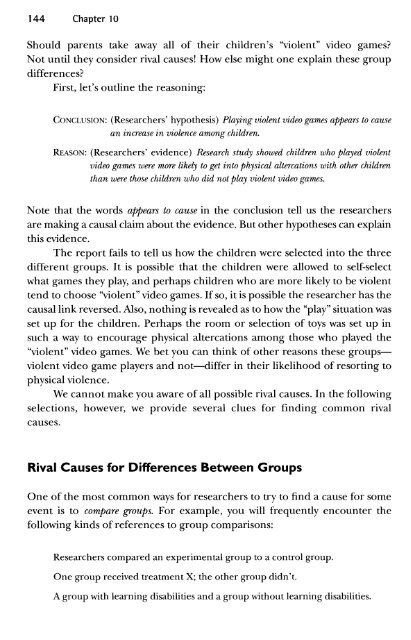Asking the Right Questions, A Guide to Critical Thinking, 8th Ed
Asking the Right Questions, A Guide to Critical Thinking, 8th Ed
Asking the Right Questions, A Guide to Critical Thinking, 8th Ed
You also want an ePaper? Increase the reach of your titles
YUMPU automatically turns print PDFs into web optimized ePapers that Google loves.
144 Chapter 10<br />
Should parents take away all of <strong>the</strong>ir children's "violent" video games?<br />
Not until <strong>the</strong>y consider rival causes! How else might one explain <strong>the</strong>se group<br />
differences?<br />
First, let's outline <strong>the</strong> reasoning:<br />
CONCLUSION: (Researchers' hypo<strong>the</strong>sis) Playing violent video games appears <strong>to</strong> cause<br />
an increase in violence among children.<br />
REASON: (Researchers' evidence) Research study showed children who played violent<br />
video games were more likely <strong>to</strong> get in<strong>to</strong> physical altercations with o<strong>the</strong>r children<br />
than were those children who did not play violent video games.<br />
Note that <strong>the</strong> words appears <strong>to</strong> cause in <strong>the</strong> conclusion tell us <strong>the</strong> researchers<br />
are making a causal claim about <strong>the</strong> evidence. But o<strong>the</strong>r hypo<strong>the</strong>ses can explain<br />
this evidence.<br />
The report fails <strong>to</strong> tell us how <strong>the</strong> children were selected in<strong>to</strong> <strong>the</strong> three<br />
different groups. It is possible that <strong>the</strong> children were allowed <strong>to</strong> self-select<br />
what games <strong>the</strong>y play, and perhaps children who are more likely <strong>to</strong> be violent<br />
tend <strong>to</strong> choose "violent" video games. If so, it is possible <strong>the</strong> researcher has <strong>the</strong><br />
causal link reversed. Also, nothing is revealed as <strong>to</strong> how <strong>the</strong> "play" situation was<br />
set up for <strong>the</strong> children. Perhaps <strong>the</strong> room or selection of <strong>to</strong>ys was set up in<br />
such a way <strong>to</strong> encourage physical altercations among those who played <strong>the</strong><br />
"violent" video games. We bet you can think of o<strong>the</strong>r reasons <strong>the</strong>se groups—<br />
violent video game players and not—differ in <strong>the</strong>ir likelihood of resorting <strong>to</strong><br />
physical violence.<br />
We cannot make you aware of all possible rival causes. In <strong>the</strong> following<br />
selections, however, we provide several clues for finding common rival<br />
causes.<br />
Rival Causes for Differences Between Groups<br />
One of <strong>the</strong> most common ways for researchers <strong>to</strong> try <strong>to</strong> find a cause for some<br />
event is <strong>to</strong> compare groups. For example, you will frequently encounter <strong>the</strong><br />
following kinds of references <strong>to</strong> group comparisons:<br />
Researchers compared an experimental group <strong>to</strong> a control group.<br />
One group received treatment X; <strong>the</strong> o<strong>the</strong>r group didn't.<br />
A group with learning disabilities and a group without learning disabilities.



